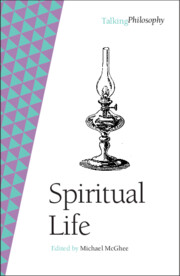Book contents
- Spiritual Life
- Talking Philosophy
- Spiritual Life
- Copyright page
- Contents
- Contributors
- Preface
- Introduction
- 1 Philosophy and Religion in the Thought of Kierkegaard
- 2 De Consolatione Philosophiae
- 3 The real or the Real? Chardin or Rothko?
- 4 Love and Attention
- 5 Descartes’ Debt to Augustine
- 6 Visions of the Self in Late Medieval Christianity: Some Cross-Disciplinary Reflections
- 7 Refined and Crass Supernaturalism
- 8 Religious Imagination
- 9 Moral Values as Religious Absolutes
- 10 Revealing the Scapegoat Mechanism: Christianity after Girard
- 11 Philosophy vs. Mysticism: An Islamic Controversy
- 12 Non-Conceptuality, Critical Reasoning and Religious Experience: Some Tibetan Buddhist Discussions
- 13 ‘Know Thyself’: What Kind of an Injunction?
- 14 Facing Truths: Ethics and the Spiritual Life
- Index
- References
12 - Non-Conceptuality, Critical Reasoning and Religious Experience: Some Tibetan Buddhist Discussions
Published online by Cambridge University Press: 18 April 2024
- Spiritual Life
- Talking Philosophy
- Spiritual Life
- Copyright page
- Contents
- Contributors
- Preface
- Introduction
- 1 Philosophy and Religion in the Thought of Kierkegaard
- 2 De Consolatione Philosophiae
- 3 The real or the Real? Chardin or Rothko?
- 4 Love and Attention
- 5 Descartes’ Debt to Augustine
- 6 Visions of the Self in Late Medieval Christianity: Some Cross-Disciplinary Reflections
- 7 Refined and Crass Supernaturalism
- 8 Religious Imagination
- 9 Moral Values as Religious Absolutes
- 10 Revealing the Scapegoat Mechanism: Christianity after Girard
- 11 Philosophy vs. Mysticism: An Islamic Controversy
- 12 Non-Conceptuality, Critical Reasoning and Religious Experience: Some Tibetan Buddhist Discussions
- 13 ‘Know Thyself’: What Kind of an Injunction?
- 14 Facing Truths: Ethics and the Spiritual Life
- Index
- References
Summary
The Dalai Lama is fond of quoting a verse attributed to the Buddha to the effect that as the wise examine gold carefully by burning, cutting and polishing it, so the Buddha’s followers should embrace his words after examining them critically and not just out of respect for the Master. A role for critical thought has been accepted by all Buddhists, although during two and a half millennia of sophisticated doctrinal development the exact nature, role and range of critical thought has been extensively debated.
- Type
- Chapter
- Information
- Spiritual Life , pp. 307 - 343Publisher: Cambridge University PressPrint publication year: 2024



